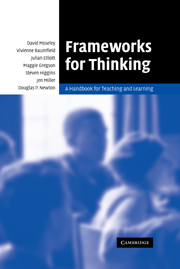Book contents
- Frontmatter
- Contents
- List of figures
- List of tables
- Notes on authors
- Foreword
- Acknowledgments
- Introduction
- 1 The nature of thinking and thinking skills
- 2 Lists, inventories, groups, taxonomies and frameworks
- 3 Frameworks dealing with instructional design
- 4 Frameworks dealing with productive thinking
- 5 Frameworks dealing with cognitive structure and/or development
- 6 Seven ‘all-embracing’ frameworks
- 7 Moving from understanding to productive thinking: implications for practice
- References
- Index
1 - The nature of thinking and thinking skills
Published online by Cambridge University Press: 22 September 2009
- Frontmatter
- Contents
- List of figures
- List of tables
- Notes on authors
- Foreword
- Acknowledgments
- Introduction
- 1 The nature of thinking and thinking skills
- 2 Lists, inventories, groups, taxonomies and frameworks
- 3 Frameworks dealing with instructional design
- 4 Frameworks dealing with productive thinking
- 5 Frameworks dealing with cognitive structure and/or development
- 6 Seven ‘all-embracing’ frameworks
- 7 Moving from understanding to productive thinking: implications for practice
- References
- Index
Summary
Perspectives on thinking
To be genuinely thoughtful, we must be willing to sustain and protract that state of doubt which is the stimulus to thorough enquiry, so as not to accept an idea or make a positive assertion of a belief until justifying reasons have been found.
Dewey, 1933, p. 16.The aim of this book is to summarise and evaluate a number of systematic approaches to describing thinking and its relation to learning and teaching which have been developed over the last 50 years or so. We believe that each of these frameworks and taxonomies have value in attempting to describe aspects of thinking. The purpose of this collection is therefore to provide a resource for teachers, learners and researchers in order to make explicit a vocabulary with which to describe aspects of thinking which are relevant across a range of situations and contexts. Without a vocabulary to describe aspects of thinking that we believe to be teachable it is hard to develop teaching approaches or pedagogies that are effective. As a learner it is difficult to understand and make connections with what we have learned at different times and to plan how to take more control of our learning in the future without the language to describe our thinking and learning. For educational researchers it is impossible to describe aspects of the educational experience without developing concepts and terminology that can be identified with some reliability (or at least agreed regularity) across teaching and learning situations.
- Type
- Chapter
- Information
- Frameworks for ThinkingA Handbook for Teaching and Learning, pp. 8 - 32Publisher: Cambridge University PressPrint publication year: 2005



